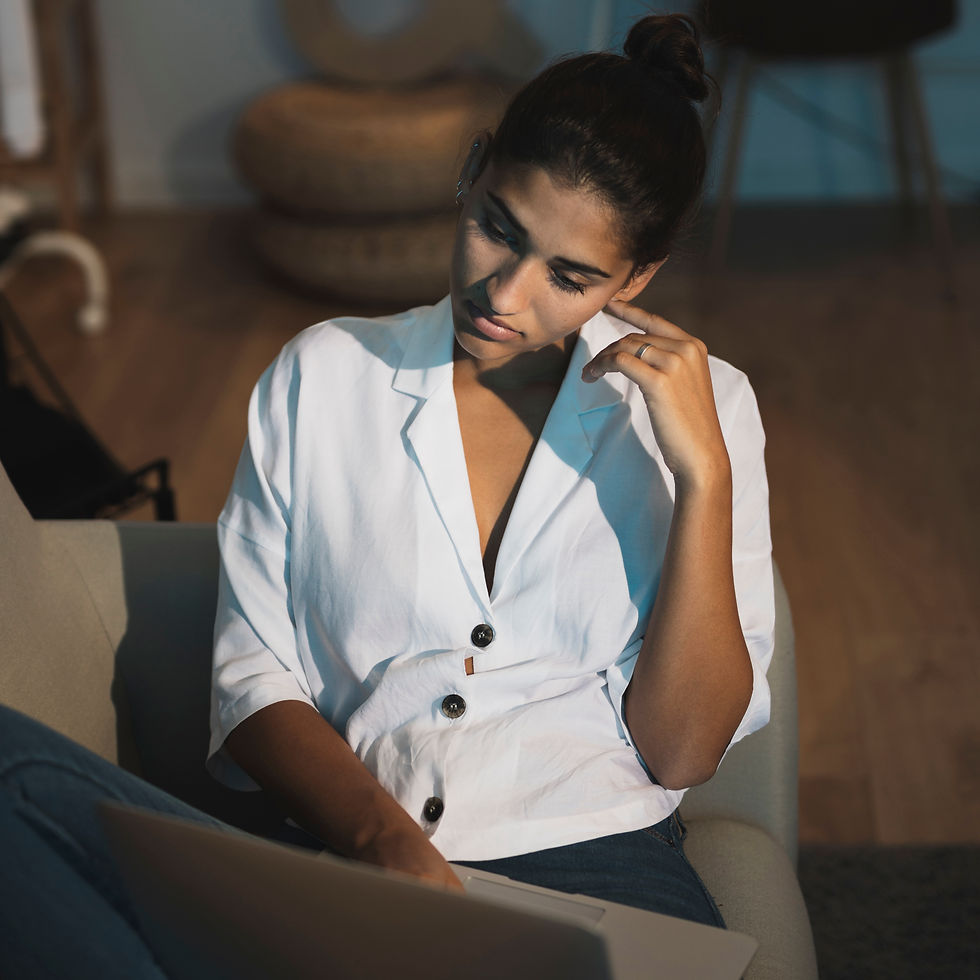- 2 days ago
- 4 min read

There is a moment many high-achieving women know well.You complete something important at work. You receive positive feedback. People seem impressed. You smile, thank them, and carry on with your day.
On the outside everything looks steady. Inside, the experience is very different.
It feels like a tightness in your chest or a small twist of anxiety in your stomach. Instead of relief, your mind begins running through everything you could have done better. You scan for mistakes, things you might have missed, and reasons the praise is undeserved. The pressure settles back in as if it never left.
For many women in senior roles, this is not occasional. It is familiar, almost predictable. It becomes the emotional cost of being the one who always delivers, the one who holds everything together, the one who never seems to drop the ball.This is the quiet reality of perfectionism. It is less about wanting to excel and more about fearing what will happen if you are anything less than excellent. Click here to download a free guide that would help you unlock inner your peace.
Why Being Good Begins So Early
Many women who struggle with perfectionism tell a similar story. They were the reliable child. The one who understood what the adults needed. The one who stayed calm, behaved well, and did not create extra work for anyone. This role was quietly rewarded. It created a sense of belonging and safety.
Over time, that early role becomes an identity. Being good becomes a way of protecting yourself. It teaches you that approval comes from achievement and that love is something you earn by being easy, helpful and responsible. These patterns settle into the nervous system long before adulthood.
By the time you reach a leadership role, the same pattern is still operating but it looks different. It appears in the hours you spend checking and rechecking your work. It appears when you take on too much because you do not want to disappoint anyone. It appears in the way you hold yourself together, even when you are tired, overwhelmed or craving support.
Perfectionism becomes the lens through which you view yourself. Not because you want to be flawless, but because something deeper believes you must be.
The Nervous System Cost of Holding Yourself to Impossible Standards
Perfectionism is not just a mental loop. It is an embodied pattern.
When your nervous system has been trained to associate approval with safety, any perceived mistake can feel threatening. Not logically, but physically.
Your body responds with subtle contraction.Your breath becomes shallower.Your attention narrows. You brace without realising it.
This is not a personality flaw. It is the biology of survival mode.
Your system learned a long time ago that being criticised or disappointing others was emotionally risky. Today, even in a safe environment, your body continues to respond as if the stakes are high.
This is why perfectionism feels exhausting.
It is not the work itself. It is the pressure, the hyper vigilance and the constant monitoring of your own behaviour. Over time, this slowly disconnects you from your intuition, your creativity and your quiet internal knowing. You begin to trust productivity more than presence and output more than authenticity.
This is where the relationship with yourself begins to erode. Not loudly, but gradually.
The Truth Beneath Perfectionism
There is a misconception that perfectionism is about standards. In reality, it is about protection. It forms around the belief that if you can stay good enough, competent enough or agreeable enough, you will be safe from disappointment, conflict or rejection.
This belief may have served you once. It may have helped you navigate family expectations or early experiences where emotional expression was not safe. But as an adult, the same pattern restricts you. It keeps you performing a version of yourself that is careful, contained and endlessly responsible.
The important truth is that nothing about this pattern means you are failing. It simply means your nervous system has not yet learned that you are safe without the performance. Perfectionism is often a sign of emotional intelligence and deep sensitivity. It reflects a part of you trying very hard to avoid pain. It does not reflect your worth.
Where Change Becomes Possible
In The Calm Collective or Your Freedom Formula 1-1 support, the work is never about forcing yourself to stop perfectionistic habits. That only creates more pressure. Instead, freedom begins by understanding the emotional roots and helping your system feel safe in a new way.
This involves reconnecting with your real needs, not the shoulds that have guided you for years.
It includes releasing old subconscious beliefs that were formed when you were much younger.
It requires building emotional safety in your body so you can respond from calm rather than fear.And when this begins to shift, something important happens.
You stop evaluating yourself through the lens of your performance.
You notice a quieter confidence that does not rely on external approval.
You start choosing what feels aligned rather than what will please everyone else.
This is what it feels like when your relationship with yourself begins to repair from the inside.
If This Speaks to You
If you recognise yourself in these words, you are not alone and you are not the problem. Perfectionism is a sign that you have been carrying too much responsibility for too long without the emotional support you deserved.
If you are ready to explore a calmer, steadier way of living and leading, where your worth is not continually questioned by your own mind, you are welcome to book a Freedom Strategy Call.
It is a space to breathe, reflect and understand what is happening beneath the surface. It is often the moment everything starts to shift.
Emma Draycott Anxiety and Burnout Freedom Hypnotherapist


